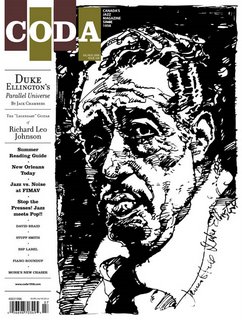
[Note: This was a guest column I wrote for Coda. It appeared in Issue 328, July/August 2006.]
Listening recently to Morph the Cat, the new album by singer-songwriter Donald Fagen, I was struck by something peculiar midway through the quirky ballad, “The Great Pagoda of Funn.” The minor oddity is a muted trumpet solo by Marvin Stamm, voiced in a jazz vocabulary that explores the upper structures of the song’s handsome changes. It’s a long solo by pop music standards, extending a full minute, and moving through an entire run of the tune’s verse structure. Moreover, at the song’s close, Fagen offers another curiosity: a second long instrumental solo, this time by guitarist Wayne Krantz, that runs for two minutes on the tune’s fade-out. Thus, “The Great Pagoda of Funn” offers two jazz-inflected instrumental breaks, running a combined three minutes (the entire duration of a standard pop song in AM radio days), and which help stretch Fagen’s ballad to nearly seven and a half minutes in length.
Now, if you know anything about Donald Fagen’s musical sensibility, you’ll recognize the staged, rhetorical quality of my surprise. Fagen’s indebtedness to jazz has been part of his press kit for more than thirty years now, through three solo albums and his long tenure as one half (with Walter Becker) of the pop group, Steely Dan. The Dan efforts, in particular, evoke a jazz “ethos” in a number of ways. Fagen and Becker allude musically, for instance, to Horace Silver’s “Song for My Father” in the intro to “Rikki Don’t Lose That Number.” They covered Ellington’s “East St. Louis Toodle-Oo” on 1974’s Pretzel Logic (trading a wah-wah electric guitar for Bubber Miley’s growling trumpet), and made lyrical reference in other songs to various jazz legends, including Thelonious Monk and Charlie Parker. Most famously, Fagen and Becker enlisted jazz players like Wayne Shorter and Victor Feldman on 1970s’ albums, or Chris Potter and Bill Charlap on more recent recordings, to contribute solos. What might be Steely Dan’s signature song, “Deacon Blues,” is itself a wistful meditation on the tragic mythos of the jazz musician’s existence, ironically celebrating a life of “drinking scotch whiskey all night long,” before “dying behind the wheel.”
Thus, Fagen, is a pop music artist who marks his relationship to jazz music habitually and self-consciously. But what makes him stand out, perhaps, is the lack of ostentation he brings to that connection. In the past twenty-five years, moments of intersection between jazz and popular music seem invariably to have been raised to the status of “event,” a point of aesthetic uncommonness that—as marketers like to insist—should command notice. Think of the hype around Sting’s first solo album, Dream of the Blue Turtles back in 1985. The presence of Branford Marsalis and Kenny Kirkland on the release elevated Sting in reviewers’ estimation from competent writer of pseudo-dub tunes (with the Police) to genre-crossing auteur. (The exceptional quality of the venture was unintentionally aided, no doubt, by Wynton Marsalis’s public tantrum over brother Branford and associate Kirkland’s concession to the dark lure of pop music.) Even more understated collaborations between jazz musicians and pop musicians suggest just enough incongruity to invite special notice. Ron Carter’s appearance with hip-hop artists A Tribe Called Quest, for example, on their 1991 album, The Low End Theory, shouldn’t have appeared unlikely, given the Tribe’s fondness for mellow loops and laidback samples, but somehow did, perhaps because it challenged the technological rigidity of hip-hop’s generic conventions.
Fagen’s turns to jazz—or blues, soul, or country—on the other hand, work against the continuing separation of American musical genres, and look back to earlier periods when ostensibly different styles bore a more organic relationship to each other. His approach resists the file-under-x commercial compartmentalization of music, and tries to recuperate the eclecticism of, say, the 1950s and 60s, when Fagen admits his sensibility was established. In a 1993 interview with Melody Maker magazine, Fagen listed, among the recordings that most influenced his approach, work by Miles Davis, Oliver Nelson, The Band, Dionne Warwick, and the Lovin’ Spoonful. Indeed, his formative models all date from a fifteen-year period when jazz was less removed from the Top 40, an era when Miles Davis and John Coltrane still recorded Broadway tunes and established their currency in jazz circles, or when Louis Armstrong and Cannonball Adderley might occasionally still approach the upper reaches of the pop charts. (Now, on the other hand, Wynton Marsalis has a minor visibility in lush, blue-tinted iPod commercials, but it’s unlikely we’ll see his “Sparks” near the top of the charts—or among the most frequently downloaded iTunes—anytime soon.) Moreover, it’s perhaps unsurprising that maybe the most dominant of Donald Fagen’s self-professed influences is Ray Charles, an artist who effortlessly defined the best of American musical eclecticism in a mix that kept recognizable elements from jazz always within earshot. When Brother Ray passed on in 2004, Fagen composed a memorial for his website that praised the catholicity of Charles’s approach, and announced, “No exaggeration: with the death of Ray Charles, we come to the end of American culture as we have known it.”
While Fagen’s commemorative announcement here is, of course, ripe with hyperbole, it does call attention to that musical eclecticism’s steady disappearance (even more threatened by the fact that a younger eclectic like Fagen is now in his late 50s), and with it, sadly, the continued dissipation of jazz music’s own relevance in the popular sphere.




0 Responses to 'Notes on Jazz: Whither Eclecticism?'